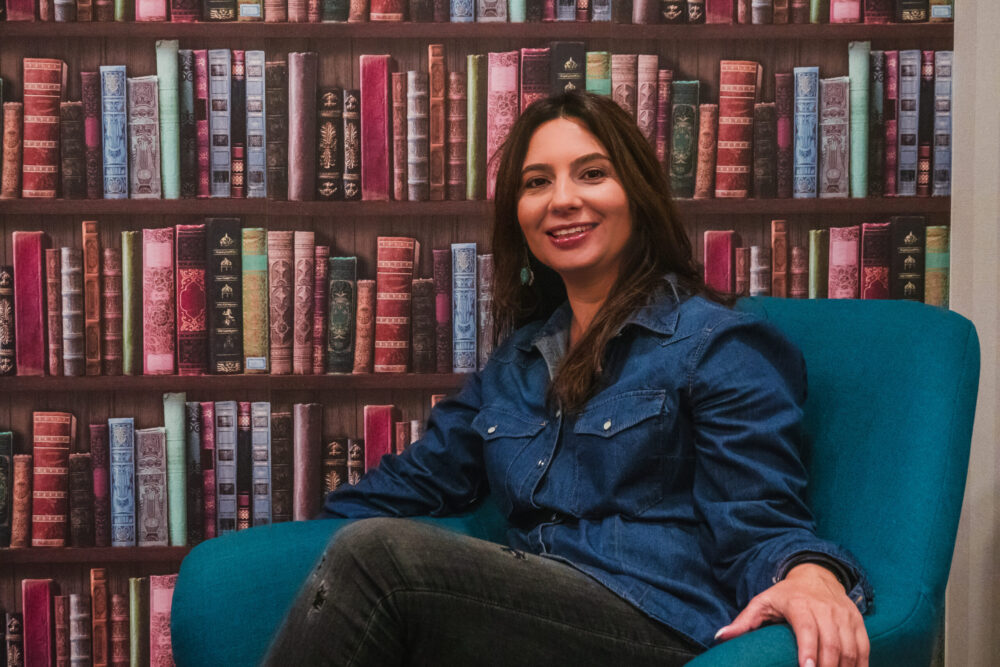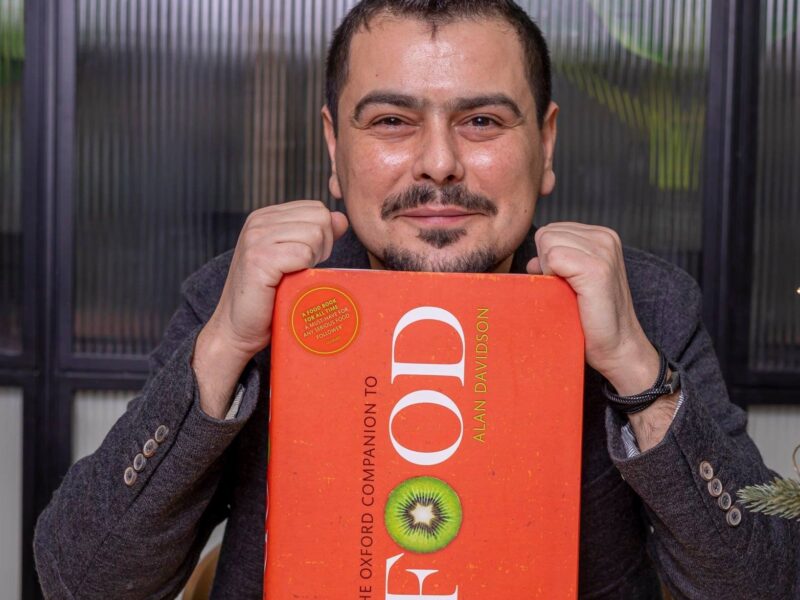Corina Tăbăraș is editorial secretary at Bookzone publishing house. She has been working in the book industry for more than twenty years, during which she has learned not only about the path of a book, but also about the way in which people and teams harmonize for good results. She also worked as a copy editor, but for a long time now she has been holding the reigns of the editorial plans and she makes sure that all the inner workings behind a book stay between the optimal parameters.
How did you come to work at Bookzone and what is your previous experience?
It’s a funny story, and those who believe in the power of intention will believe me. One morning, in the subway, I was reading the news in a daily newspaper and, while skipping from one thing to another, a nice job offer caught my eye and I told myself: there is a ray of sunshine after all, a glimmer of hope, not everything is grey…
So, one day, I met the right person, who showed me the way towards this place, which I found to be just like in the description, from the environment to the people.
I arrived in the editorial world sometime in `97, after I worked in press (my dream was to get into radio and television), for a weekly magazine, where I discovered just how great it was to meet people you had never even dreamed you would look in the eye while they shared their life experiences – writers, songwriters, singers. I learned something from each of them, something that would make me discover myself, that would make me wish to continuously improve myself.
This is how I figured out how important communication is, the way in which you interact with and connect to people.
I began at the Național publishing house, as a copy editor, then I became editorial secretary. I learned how a book was made there, basically, I had the honour to meet amazing people, who shared everything they knew with a lot of patience. I did my apprenticeship there and I later followed my path, I worked at Aramis publishing house, at Litera publishing house, and now I’m with Bookzone publishing house.
What does your working day look like?
Experience has taught me that this job is ”with people and for people”.
After analysing all the experiences I had at every publishing house I worked at, I can say that today my working day begins differently from how it began yesterday, because the job of an editorial secretary entails different things in different workplaces, starting from the mere translation of the job title. Many believed that you were some kind of secretary, some sort of a jack-of-all-trades. (I remember that sometime in the early 2000s a manager, who probably did not know the significance of the job positions from a publishing house, told me to make his coffee... this, alongside the specific attributions of the job, which far exceeded my working time. I find it funny now, because I gained wisdom, but it did not sit well with me back then, I did not like the attitude, the way in which he addressed me.) As an editorial secretary it is necessary to have a complete vision, to know very well how each department functions, in order to be able to gather the information you need for the optimal planning and organization of the editorial stages on your own, as much as possible.
My working tools are the mail and the editorial plan. I look at the titles programmed for a week from now, then for a month, so that I can have a complete image and organize a working plan, assigning the necessary deadlines to the people who work at the completion of a book, from the translators, copy editors, proof-readers, to the one who designs the cover. I follow the stages of the manuscripts which are already in the working stage, and check whether their release dates suffered any changes. The marketing department handles the scheduling of the releases according to the importance of the subject, carefully choosing the moment when a book should be released on the market. And all of these happen while also managing unpredictable requests and emergencies.
After all these stages I check whether all the copyright contracts with the collaborators were signed – translators, copy editors, proof-readers, in one word: everyone, up to the last person who concludes the editorial process. My sphere of responsibility also includes handling the payment schedule regarding all the types of contracts mentioned before, and managing the costs which accompany this editorial process.
As a conclusion, if the publishing house operates according to certain working protocols and each person knows where their responsibility begins and ends, the work is already 50% done, because the editorial activity implies teamwork. And if you don’t know how to work in a team you can’t really do your job. The remainder of the percentage is related to the talent you gain in time related to prioritizing, analysing, calculating each editorial step, in order to be able to respect the deadlines. Not even in the background, between all these stages, it’s not at all easy. And there are differences from one editorial kitchen to the other (it’s like at the restaurant, it depends on how spicy you prefer your foodJAs I was saying, the ability you gain by acquiring the art of communication intervenes, the ability to make it good for yourself and for the others, too. Most negotiations take place during phone calls, sometimes you don’t even know the person, while other times you are lucky enough to know them. And in this context everything becomes what I consider to be a discussion between friends, where it’s much easier to speak freely.
Besides these phone calls you also deal with the other elements which complete the editorial process: title pages, covers, ISBN codes, details about internal and external copyright, briefings about the payments of the collaborators, discussions with the colleagues in order to find the best solutions in certain situations. In other words: you do and undo things until the manuscripts come close to seeing the light of the printing press; from then on the responsibility belongs to other colleagues in the publishing house (the more technical ones), the responsibility to transform them in the books which will be leaving for the readers’ bookshelves.

I imagine that you’re permanently connected with all the departments of the publishing house. How these collaborations work and what is a good collaboration based upon?
As I was saying earlier, from my point of view, the key to success is to know what each person from your team does. The basis of a good collaboration is education, and hence the ability to harmonize your language with any other person’s, regardless of their background. Openness and empathy are needed in order to accept the fact that our personalities are different. It’s like you’re this little amateur psychologist, and this is also something you learn with time, after experiencing certain things: how much you should control yourself, how much you should allow and where you should set the boundaries in relation to someone. I cannot say that I have completely mastered this self-control, but what I know for sure is that I managed to be a team player. Actually, this is what kept me going at every job – the team.
As general editorial secretary you are in a position where it’s necessary to be a good speaker and organizer, and to be balanced – a mix of all of these, so as to be ready to diffuse tense situations. If you step back and detach yourself from the situation, without the destructive emotions I felt many times at the beginning of my career, work is going to feel like play: enjoyable
Beside the ability to communicate, you should be capable of spontaneity when making decisions, but you should also be rigorous, in order to manage each step/detail carefully, just like a clock maker.
What are the greatest challenges you have faced until now in the editorial field?
I cannot tell you if I have faced the greatest ones or if they’re yet to come... I am telling you this because, after you get over a difficult situation, you already stop feeling how difficult it was, because you have left everything behind.
The greatest and, at the same time, the most unpredictable challenge is the one related to the people involved in this editorial process. That is the case when the publishing house wishes to publish a book in an older translation. You might not have any idea about where to find that translator or they might not even be alive anymore. And you have to go search for inheritors or for other links. This is the game in which you are challenged to obtain what it is that is wanted – to make the impossible possible: to make it possible for that title or that translation to be published under the name of your brand.
What about the biggest satisfactions?
The greatest joy is feeling that you are part of a community, together with those you work with; that chemistry which cannot be ignored in any aspect of our lives should not be missing. You derive satisfaction from this, from the fact that you are part of a team, that you achieved what you had to achieve and that every day you gained another experience, another accomplishment. In this job you serve as an interface: most of the times you are the first person who opens the door to a new collaborator, be they an author or a translator. The foundation of the future relationship between that person and the publishing house depends on your attitude.
So another satisfaction in this job is seeing that you are appreciated by the one you followed along the path of their book.
How did your studies help you in the job you have today?
My studies helped me ”work with people”, the talent to adapt to things stems from them, to learn, to find the best role models.
What would you suggest to a young person interested in working in the editorial field? How should they prepare their CV?
The editorial domain is very rich in experiences, given that the departments of a publishing house are diverse and the smooth running of things requires the interplay of numerous working styles. So it depends a lot on the qualities and abilities our candidate has. Regardless of the department they want to apply for, my advice is that they should try to obtain an internship in one of the publishing houses in Romania. Some of them have internship programmes which can be very useful.
Another less popular variant would be to participate in as many conferences or training courses, through which they can find out more about the Romanian book market, but also about the foreign book market. It could be a starting point in order to better understand the field.
And, maybe the most important thing, it would be advisable to read. Anything, anytime, anyhow. J

Bookzone publishes titles from different categories and in various formats. What are the most demanding types of books from your point of view?
Indeed, Bookzone publishes various titles: young adult, fiction, educational books and activity books for children, personal development, romance, erotica, thriller. And the list can go on. J For us, the most demanding titles are the personal development ones, because we rely on the translation and the adaptation of the medical or scientific terms, in order to offer our readers the correct and relevant information. The work behind the release of a personal development book is immense and it involves an army of people, so that the final product can truly help the person who chooses the respective title.
Another category of titles which are considered to be demanding would be the activity books, most of which are translations. With them, things become complicated, when you have to adapt crosswords/games to the Romanian language, or rename the characters to whom the Romanian children can relate. Activities are very important in children’s development and we try to offer the parents and the educators useful and attractive choices.
How does the path of a book look like at Bookzone?
In its portfolio, Bookzone has both books by Romanian authors, and translations. When it comes to the Romanian authors, the manuscripts are read, analysed, and selected. The next step is the estimation of the publishing costs, so that there is a basis for the negotiation of the contract with the author. Most of the times, Bookzone chooses to support budding authors by taking the production costs upon itself, even with the risk of not retrieving the initial investment, but this greatly depends on the subject of the book and on the way in which we can integrate it within the publishing house.
On the other hand, most of the time, the foreign books reach us through literary agents, with whom the copyright contracts are negotiated. The books are translated and adapted to the book market in Romania. The process involves a carefully chosen translator, bearing in mind the peculiarities of the book and their experience as a professional. The translator meets the book first, then it’s the copy editors’ turn, in order to check the content and the form. Some books are even read twice, by different copy editors.
Following the path of the book, the techno editor takes care of the layout of the final version text and prepares it for print. The proof-reader goes through the text and makes sure that no mistakes slipped through from the previous step. The cover is created, and the editor-in-chief gives the “imprimatur”. From here to the readers there is only one step left, supported by intense advertising: the release on the market, in bookshops, in libraries, or online.
What are the Bookzone bestsellers and what counts as a bestseller?
Sadly, in Romania there are no regulations which offer the readers the ranking of the best sold books. At Bookzone, we consider that titles which surpass 50.000 sold copies are bestsellers. Among the titles which surprised us by exceeding this number we must mention: Trăiește autentic/Live Authentically and Ziua în care m-am iubit cu adevărat/The Day I Truly Loved Myself by Andreea Săvulescu, O viață și încă o zi/A life and One More Day by Alexandru Gulie, Jurnalul unui burlac. Conversații cu mama/The Diary of a Bachelor. Conversations with my Mom by Mihai Bendeac.
How does the profile of the Bookzone reader look like?
Our reader categories are diverse, given the diversity of the published titles, but our prevailing public is made out of women, 20-40 years old, the urban environment, average income.
What are the media through which you sell books?
Our books are available online, on bookzone.ro, in other partnering online bookshops, but also in physical bookshops across the country.
You also manage the recruitment of new collaborators or employees. What are the criteria according to which you evaluate them?
It’s true, I am also the one who takes care of finding the suitable translators, copy-editors, and proof-readers for the books which become part of Bookzone’s portfolio. The selection criterion is the classical one, used in the editorial world: tests are taken, and based on their results, it is decided who takes the work, and what the topic is.
Does the best or the most beautiful book in the world exist?
The answer is definitely subjective here, if I like something, that doesn’t mean you like it too. As long as ink is still flowing on pages, I consider that it’s difficult to say which book is the best, or the most beautiful. If we’re talking about the present moment, then probably everyone has a different genre and, implicitly, a different book they love.
It’s difficult for me to make a ranking, to tell you what the most loved book is, because I was part of those people who did the compulsory readings and that was how I discovered that I liked many of them. What has stayed with me is Șatra/The Gipsy Camp by Zaharia Stancu and Viața pe un peron/Life on a Train Platform by Otavian Paler.
[Photos are part of Corina Tăbăraș's archive.] [Translated into English by Irina-Adelina Găinușă.]



